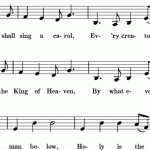This episode, the penultimate of the Tom Baker era, introduced two new characters: Nyssa, who would become the companion of the Doctor for some time thereafter, and a new actor playing the Master who would appear quite frequently from that point onward. After Roger Delgado’s death, he having played the role since its introduction during the Jon Pertwee era, there had clearly been a desire to bring him back, and there had been a couple of appearances of a deteriorating humanoid representing the Master clinging to life. Whether the plan at that stage was already to have him find a way to steal the life of another person I do not know. But since he steals the life and form of Nissa’s father, in the episode that introduces them both, the two remain connected at a visceral and emotional as well as a narrative level.
It hadn’t really struck me that in this period the Doctor’s companions regularly included school-age children. One reason for that might of course be the fact that the actors who depicted them were quite obviously older than their characters were supposed to be. I find myself wondering now, however, whether there was a conscious decision to have a younger Doctor and younger companions to help the show connect with younger viewers. Did young people watching the show feel they could relate to Adric, Nissa, and Turlough more than they could to Romana, Sarah Jane Smith, or Jo Grant?
There are other sources whose canonical status is ambiguous (mostly audiobooks) that explore Traken’s mythology and the involvement of their god in creating the Source, which the Master seeks to obtain access to. The episode itself features Melkurs which are beings and forces of evil that are attracted to Traken and there calcified, literally turned to stone, by its peaceful atmosphere. Some of them, we are told, are redeemed. The Trakenite Empire is said by the Doctor to be a whole empire “held together…by people being terribly nice to one another.” The Doctor’s limitations even as a time lord are emphasized such as when he tells Adric that he doesn’t always know what is going on, adding, “If I knew everything that was going to happen, where would the fun be?” He also seems to cast doubt on his own goodness when he says, “They say the atmosphere there was so full of goodness that evil just shrivelled up and died. Maybe that’s why I never went there.” After Adric tells him what he said was silly, in response to his axiom “what cannot be cured must be endured,” he quips, “Don’t listen to me – I never do.”
The episode has religious overtones, including but not limited to when it is said, “The Fosters are the guardians of the spiritual welfare of our capital,” and when twice mention is made of Kassia’s purity of spirit or spiritual qualities. The fact that the Master is able to deceive them then suggests that spirituality may be naive, hinting that goodness and purity might be no match for evil without the help of some whose goodness is more qualified and ambiguous. It is also noteworthy that the episode does not simply play “science and understanding” off against spirituality. The Trakenites have relied on both in the past, and yet their confidence in the Keeper and in the inherent goodness of their way of life makes them blind to corrupting influences of a more subtle sort.













